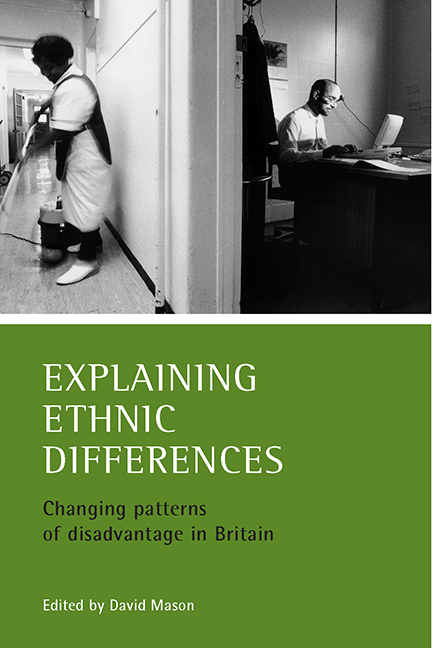Book contents
- Frontmatter
- Contents
- List of figures and tables
- Foreword
- Notes on contributors
- one Introduction
- two Changing ethnic disadvantage: an overview
- three The demographic characteristics of people from minority ethnic groups in Britain
- four Ethnic differentials in educational performance
- five Changing patterns of ethnic disadvantage in employment
- six Patterns of and explanations for ethnic inequalities in health
- seven Housing black and minority ethnic communities: diversity and constraint
- eight ‘All the women are white, all the blacks are men – but some of us are brave’: mapping the consequences of invisibility for black and minority ethnic women in Britain
- nine Police lore and community disorder: diversity in the criminal justice system
- References
- Index
four - Ethnic differentials in educational performance
Published online by Cambridge University Press: 20 January 2022
- Frontmatter
- Contents
- List of figures and tables
- Foreword
- Notes on contributors
- one Introduction
- two Changing ethnic disadvantage: an overview
- three The demographic characteristics of people from minority ethnic groups in Britain
- four Ethnic differentials in educational performance
- five Changing patterns of ethnic disadvantage in employment
- six Patterns of and explanations for ethnic inequalities in health
- seven Housing black and minority ethnic communities: diversity and constraint
- eight ‘All the women are white, all the blacks are men – but some of us are brave’: mapping the consequences of invisibility for black and minority ethnic women in Britain
- nine Police lore and community disorder: diversity in the criminal justice system
- References
- Index
Summary
Introduction
In Britain, the groups commonly referred to as ‘ethnic minorities’ did not ‘just happen’ to migrate and settle recently in Britain, nor do they ‘just happen’ to suffer racism in Britain. Rather, they are groups whose identity in British society is shaped by migration and ‘race’ as well as distinctive ethnicities. They are ‘racialised ethnicities’ (Modood et al, 2002; see also CMEB, 2000). Hence, themes of ethnicity, ‘race’ and migration shape the choice of groups under discussion here and frame the presentation offered. The groups in question have many features in common with the rest of British society such as the determining character of social class; but our concern here is with what distinguishes them from the rest of society and the interaction of the differentia and the commonalities.
From diverse beginnings
The educational qualifications profile of the non-white minority groups at the time of migration and now are quite diverse. Some minority groups are proportionally less qualified than their white peers, and some much more so. This is true when we look at the population as a whole or those who have recently finished their education. Broadly speaking, the ethnic minority population can be divided in two:
• Caribbean, Pakistani and Bangladeshi ethnic groups have lower average qualification levels than white people;
• Indian, African Asian, Chinese and African ethnic groups are more likely than white people to have a higher qualification (A-levels and above).
Among the critical factors in explaining the qualification levels of these groups today is the qualification profile at the time of migration. This can be seen in Figures 4.1 and 4.2. Figure 4.1 shows the proportion among the minority groups without qualifications divided into three ‘generations’, as well as the qualification levels of white people for the most recent two generations. The source of the data is the Policy Studies Institute (PSI) Fourth National Survey of Ethnic Minorities, which was conducted in 1994. Beginning with the migrant generation, we see that the six minority groups covered by this survey fall into two groupings. The Caribbean, Pakistani and the Bangladeshi groups had high proportions without GCSE or equivalent qualifications (60-75%). On the other hand, only about 45-50% of Indian, African Asian and Chinese migrants were without this level of qualification.
- Type
- Chapter
- Information
- Explaining Ethnic DifferencesChanging Patterns of Disadvantage in Britain, pp. 53 - 68Publisher: Bristol University PressPrint publication year: 2003
- 2
- Cited by



